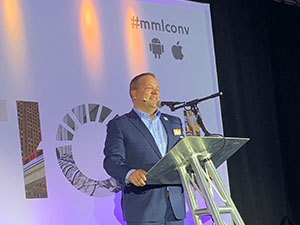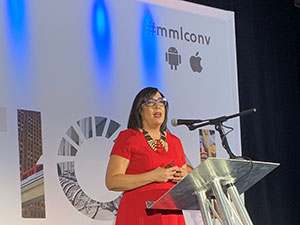By Lisa Donovan
Inclusivity was an overarching theme for both speakers in the Thursday afternoon General Session, although they each approached the topic from a little different angle.
 Bryan K. Barnett
Bryan K. Barnett
First up was Bryan Barnett, mayor of Rochester Hills. With his new role as president of the United States Conference of Mayors (USCM), Barnett has had the opportunity to see mayors in action all across the country and beyond. In his presentation Local is the New Black, he highlighted the important role of local leaders.
“Everyone in our culture is turning local. Local is cool and celebrated – local food, locally sourced and grown products, where we shop and buy,” he said. “Local government is the sweet spot. Our residents know where their local officials come from. They’re locally grown and sourced.”
“The good news is that we’re operating from a position of strength,” he continued. “We’re closer to the people and we have to act – no shut downs, no excuses. You must lead and do.”
With that in mind, Barnett is continuing to promote USCM’s three-pronged agenda.
- Infrastructure – Local government is best suited to determine infrastructure needs. USCM is working on issue on several fronts, including encouraging Washington to pass a $2 trillion infrastructure package and delving into how Opportunity Zones can help Michigan communities.
- Innovation – We need to lean into innovations such as smart cities and autonomous vehicles and understand resident-centric smart solutions. One example is Rochester Hills recycyling program that places a computer chip on every recycling can and offers reward points. Recycling has improved from 18 percent to 85 percent.
- Inclusion – Local leaders are in a unique position offer workable solutions. In Grand Rapids, Mayor Rosalynn Bliss’ focus on diversity and inclusion has resulted in amore diverse publice safety department. The number of diverse applicants has increased dramatically. In Rochester Hills, one way they have approached diversity and inclusion is to audit all their communications to ensure that they showcase how the city wants to be viewed.
 Nikki Pardo
Nikki Pardo
Next up was Nikki Pardo, owner of Global Alliance Solutions, a consulting company that offers customized diversity training. In her presentation Building Blocks: Creating Inclusive Communities, she stressed that diversity is not just about race and gender, it’s about diversity of thought, experience, perspectives, socio-economic levels, urban and suburban – a whole collection of differences. Within the realm of diversity, she draws a distinction between equality and equity. Equality means that everyone is entitled to opportunities and they’re treated with respect and fairness. Equity means that everyone is given the tools and support they need. the stage is set for the scales to be balanced. For example, the equitable way to deal with a housing problem is not to impose a top-down solution, but find out what kinds of housing people need to meet their needs. Equity is what we all want to achieve in our cities.
Next, Pardo touched on inclusion, where the goal is for everyone to feel like they have a relevant voice and you care about their well-being. It’s important to avoid stereotyping and be aware of any unconscious biases you may have. She cited the example of symphonies in the 1960s and 70s. Most symphonies were comprised primarily of men, so some began having blind auditions where the identity of the musician was unknown. That resulted in a great increase in women passing auditions. Another example is companies that redact names from the resumes of potential employees to balance the playing field.
Another point she covered is integration. The primary aim of integration is to create a welcoming environment where people feel included, a sense of belonging, and that their culture is being respected and preserved. She cited the example of Mexicantown in Detroit. At one point there were conversations about eliminating Mexicantown and calling it southwest Detroit. That almost created a revolt among residents because of the historical and cultural value in their community. We need to appreciate differences – all differences – and engage residents in decision-making processes.
Lastly, Pardo focused on crisis response, particularly in incidents related to marginalized groups. Have key players already in place, but appoint one spokesperson, such as the mayor, councilmember, or police chief. Remember that transparency equals trust, so be honest. And develop appropriate messages with no biased language.
